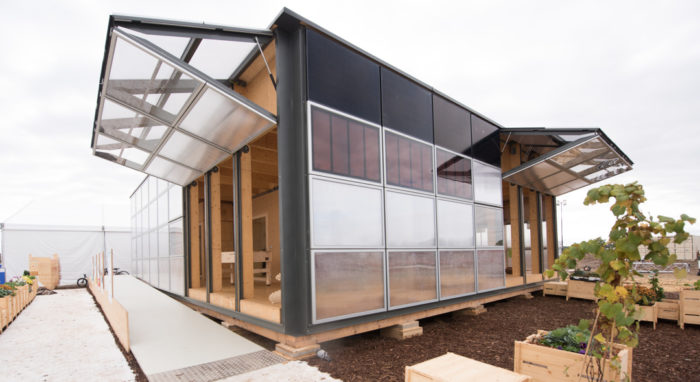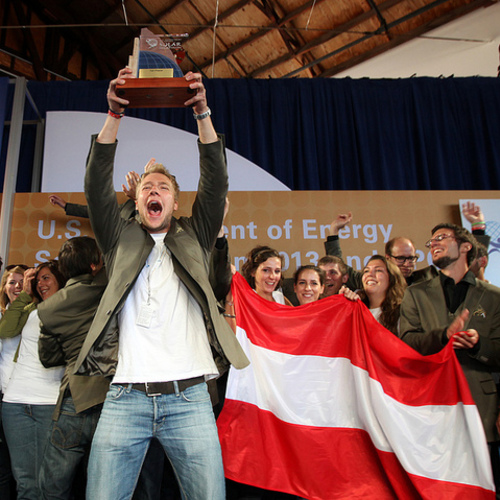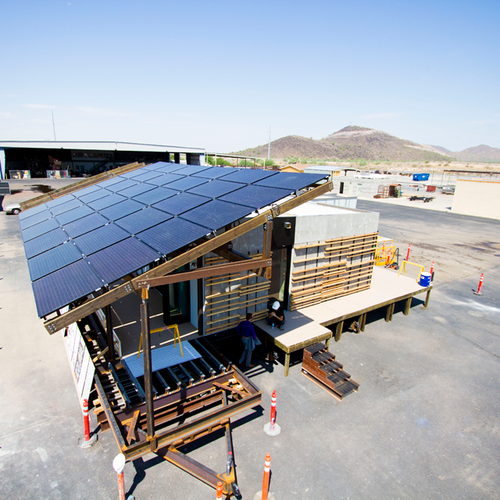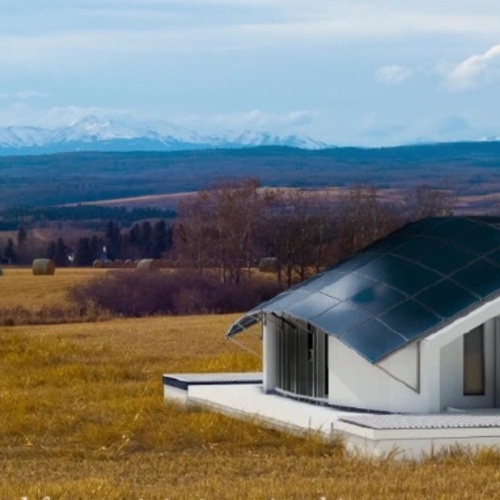Image Credit: Dennis Schroeder / Department of Energy
Image Credit: Dennis Schroeder / Department of Energy The Swiss "NeighborHub" project was designed to be a community gathering spot in addition to serving as a dwelling. Bedroom of the Swiss Solar Decathlon entry.
A team representing four Swiss schools emerged as the overall winner in this year’s Solar Decathlon in Denver, Colorado, with an entry called “NeighborHub.”
The biennial competition included a total of 11 student teams this year, two of them from Europe, that have been at work for nearly two years designing and building solar-powered demonstration homes. In addition to competing for the overall winner’s title, teams also were judged in 10 separate areas, such as architecture, market potential, innovation, and engineering.
Student teams typically seek partners to help cover the expense of developing, building, and moving the houses. This year, for the first time, the Department of Energy also awarded cash prizes, including $300,000 for the first place winner.
The Swiss team was comprised of students of from École Polytechnique Fédérale de Lausanne; School of Engineering and Architecture Fribourg; Geneva University of Art and Design; and the University of Fribourg. Their entry, according to a project description provided by the Department of Energy, was designed so that in addition to being used as a dwelling, the building also could be used for community meals, educational workshops, or even bicycle repair.
“This flexibility ensures that, over time, the house will meet the needs of the greatest number of occupants while using the least amount of land and facilitating strong connections within the neighborhood,” the team said.
Among NeighborHub’s features:
After the competition, the house will be shipped back to Innovation Square in Fribourg, which already includes research and development facilities.
Competition on many levels
Each of the houses is about 1,000 square feet. Students not only have to design the houses, but also figure out how they can be knocked down, shipped to the site of the competition, and then reassembled on a tight schedule.
Each of the 10 contests had its own objectives and scoring rules. Organizers said this year’s contest put special emphasis on innovation, water use, energy use, and market potential. By the end of the competition, Switzerland had accumulated 873.409 points to become the overall winner with first-place finishes in six separate categories.
The University of Maryland was second with 824.717 points, and a team from the University of Denver and the University of California, Berkeley, was third with 808.635 points.
In addition to assembling and running their demonstration homes under deadline pressure, student teams also contended with weather that brought rain, sleet, snow, and wind to the site near the Denver airport. Dutch and Swiss projects were shipped through Houston, which had been struck by Hurricane Harvey just a couple of weeks before teams were due in Denver. Shipping snafus also slowed down other teams. Snow in Denver prompted officials to close the Solar Decathlon for one day out of safety concerns, according to an article in The Denver Post.
But students were clearly delighted with the opportunity to see their projects finally come to fruition, and to see what other competitors had cooked up.
Typical was this comment from Flavia Viscardi of the Swiss team, who was asked what she considered to be the highlight of the competition: “Meeting the other teams. And the fact that the competition is real now. We’ve been working on it two years, and now it’s concrete. The best thing is being in the United States and to actually build the dream.”
Weekly Newsletter
Get building science and energy efficiency advice, plus special offers, in your inbox.
















0 Comments
Log in or create an account to post a comment.
Sign up Log in